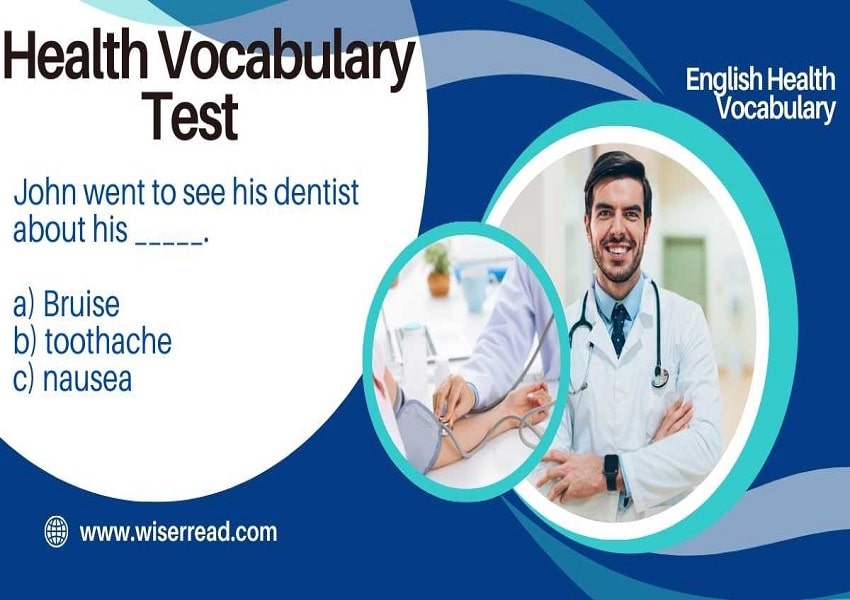Welcome to the Health Vocabulary Test! This quiz is designed to help you learn and reinforce important terms related to health, wellness, and the body. Whether you’re a student, a health enthusiast, or just curious.
This test will help expand your understanding of key health and medical vocabulary concepts in an easy and fun way. Get ready to explore words that are essential to understanding how our bodies function and how to live a healthier life.
Health vocabulary test quiz
Let’s start click and give exam of 15 quizzes. After giving exam you’ll get your expected rate.
Read and participate also Vocabulary test: Flower vocabulary quiz
Examples and exercises of the Health Vocabulary test
1. During her first trimester of pregnancy, Maria often experienced morning ____.
a) Buruises
b) flu
c) nausea
2. John went to see his dentist about his _____.
a) Bruise
b) toothache
c) nausea
3. Sarah _____ to remove her appendix
a) Endured pain
b) had a check-up
c) got vaccinated
4. I had a large _____ on my leg where my brother had kicked me
a) bruise
b) rash
c) sunburn
5. There’s a nasty _____ going around the office at the moment.
a) blister
b) stomach bug
c) sprained ankle
6. ______ is a piece of cloth that you wrap around an injury.
a) Ointment
b) cast
c) bandage
7. Milan broke his leg, so the doctor made a ______ around his broken le
a) cast
b) ointment
c) medicine
8. He had had a big hole in his tooth before the dentist made ______ in the hole.
a) injection
b) cast
c) filling
9. Doctors use ______ for cleaning a patient’s skin before injection
a) bandage
b) cotton wool
c) plaster
10. What does “nutrition” refer to?
a) The study of diseases
b) The process of taking in and using food
c) The process of breathing
11. Which term describes the body’s ability to fight off illness?
a) Immunity
b) Digestion
c) Circulation
12. What is “hydration”?
a) The process of sleeping well
b) The intake of water to keep the body hydrated
c) The process of exercising regularly
13. What does “cardiovascular” relate to?
a) The brain
b) The heart and blood vessels
c) The stomach and intestines
14. What is “metabolism”?
a) The process of breaking down food to produce energy
b) The process of storing fat
c) The process of walking and running
15. Which of the following is a sign of “dehydration”?
a) Clear urine
b) Dry skin and thirst
c) Frequent hunger
Answers of all questions about Health Vocabulary
- c) nausea
- b) toothache
- b) had a check-up
- a) bruise
- b) stomach bug
- c) bandage
- a) cast
- c) filling
- b) cotton wool
- b) The process of taking in and using food
- a) Immunity
- b) The intake of water to keep the body hydrated
- b) The heart and blood vessels
- a) The process of breaking down food to produce energy
- b) Dry skin and thirst
FAQs on Health Vocabulary Quiz test
What is the Health Vocabulary Quiz?
The Health Vocabulary Quiz is a fun and simple test designed to help you learn key health terms. It covers important concepts about nutrition, the body, fitness, and wellness.
Who can take this quiz?
Anyone interested in improving their understanding of health-related terms can take the quiz! It’s great for students, health enthusiasts, or anyone curious about health.
Is there a time limit for the quiz?
No, there is no time limit. Take your time to think through the questions and choose the best answers.
What is Health Vocabulary?
Health vocabulary refers to the specific words and terms used to describe topics related to health, wellness, the body, and medical care. These terms help us understand how our bodies function, how we can stay healthy, and how to discuss health-related issues with others.
Why is learning Health Vocabulary important?
Learning health vocabulary is important because it allows you to understand how your body works and helps you make informed decisions about your health. It also helps you communicate clearly with doctors, nutritionists, and others about your well-being.
How can I improve my Health Vocabulary?
You can improve your health vocabulary by reading articles, books, and websites about health, taking quizzes, or talking with healthcare professionals.
The more you practice and learn, the better you’ll understand and use health-related terms in everyday conversations.

